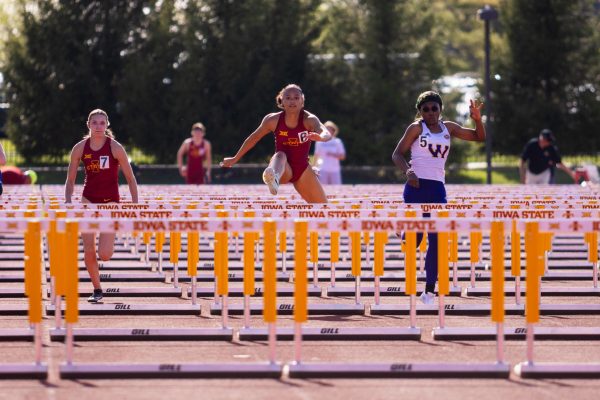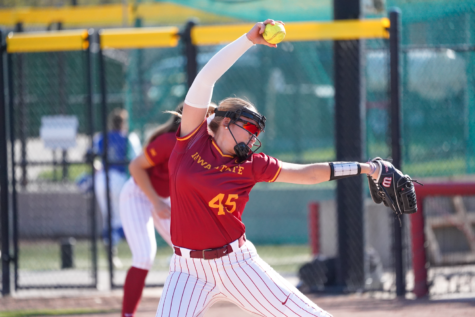Disciples
December 8, 2005
Editor’s note: This is the second in a two-part series profiling ISU football coach Dan McCarney.
It may be one of the most successful coaching staffs in the history of college football.
It could be said that many a football program owes its success to the University of Iowa and Hayden Fry, as the staff Fry assembled upon his arrival at Iowa in 1979 has left its mark both at Iowa and around the college football world.
Six former Fry assistants now hold head coaching jobs in Division I-A. They have delivered 39 bowl games and one national championship. And two of those coaches are right here in Iowa.
Kirk Ferentz, head coach of the Iowa Hawkeyes, and Dan McCarney, ISU head coach, are two of Fry’s disciples that have gone on to find success as head coaches after taking over rebuilding jobs.
At Iowa, Fry and his staff took over a program that had 17 straight losing seasons. Iowa would suffer two more in Fry’s first two years, increasing the streak to 19, but Fry and company snapped the streak in impressive fashion with an 8-4 record, a Big Ten championship and a Rose Bowl appearance in the 1981 season.
THE DESCENDANTS
Iowa would play in two more Rose Bowls following the 1985 and 1991 seasons, including a school-record streak of eight straight bowl games.
McCarney said it is no wonder many from the staff were hired to orchestrate their own rebuilding jobs.
“I think any time you do something so unbelievable and dramatic – like going to the Rose Bowl in our third year at Iowa and all those things that Hayden did – I’m sure that opened people’s eyes,” McCarney said. “It didn’t hurt when Bill [Snyder] went and got a head job and got that going. Then Barry [Alvarez] left Notre Dame and got the job at Wisconsin.
“It’s almost staggering to stop and think of it. All of us were young guns and nobody knew who any of us were. We just followed Hayden and his plan and the rest is history now.”
Synder was the first assistant to leave and take over a program as head coach, going to Kansas State, where he engineered one of the greatest rebuilding jobs in the history of college football.
After inheriting a team that was 0-21-1 in the two years leading up to his arrival, Snyder posted a winning record in year three and a Copper Bowl in year five. The Copper Bowl was the start of a string of 11 consecutive seasons with a bowl game.
Alvarez made a pit stop at Notre Dame as an assistant before he took over at Wisconsin, raising the program to unprecedented levels of success. Alvarez will retire after Wisconsin’s Capital One bowl game to become the Badgers’ athletics director. Bret Bielema, another former Fry player and assistant will take over as head coach.
Bob Stoops played and coached for Fry before winding up at an Oklahoma program that had started to slip, where he restored the glory and won a national championship in 2000.
Mike Stoops, like his brother, played and coached for Fry and took over another rebuilding job at the University of Arizona in 2004.
Ferentz said the staff didn’t know at the time that in the not-so-distant future, everywhere they looked would be a former Iowa assistant rebuilding a football program.
“Initially, we didn’t know what we were about to do,” Ferentz said. “Throughout the late ’80s, when the staff started to break up, and right through the end, we were all pretty focused on what was in front of us and what we were trying to do.
“Because of Coach Fry and his vision and leadership things were able to pull together. I think probably part of his wisdom was not only picking the right players, but as history has proven we had a pretty good staff. All of us came from pretty humble beginnings so you have to give him a lot of credit for selecting the right people.”
BREAKING UP AND MOVING ON
Ferentz said there isn’t any doubt that schools looked at what they did at Iowa in the ’80s when they went to hire the coaches later on, especially with Synder at Kansas State.
“Bill was the first to get a head job and that program’s history was much weaker than Iowa’s was when Coach Fry came here,” Ferentz said. “My guess is the [Kansas State] athletics director at the time probably thought the way to go was taking a top assistant from a program that’s traveled the same road. I think a lot of us probably though he was a little off-center to even take that job. He certainly proved us wrong and did a phenomenal job.
“It was probably the same thing at Wisconsin with Barry and certainly with Dan at Iowa State. With Dan’s case, he’d been through the process twice, once at Iowa and once at Wisconsin. I think it made perfect sense, and obviously that decision has paid off.”
Paid off may be an understatement. Those three hirings – Synder at Kansas State, Alvarez at Wisconsin and McCarney at Iowa State – resulted in each of the coaches becoming the all-time win leaders at their schools.
Ferentz credited Fry with creating the proper balance between “resumes and chemistry” that was needed to create a winning program, a fact often overlooked.
“There are some different approaches [to building a staff],” Ferentz said. “I was a grad assistant at Pittsburgh in 1980 before I came to Iowa in 1981. Coach [Jackie] Sherrill had great success at Pitt and for the most part, he hired resumes and guys with big credentials.
“When I came to Iowa it was just the opposite. Basically, we were all underdogs,” he said. “That was a great life lesson for me, coming from Pitt, where the staff didn’t necessarily have great chemistry, whereas at Iowa we had phenomenal chemistry and really enjoyed working together.
“It’s personal preference, but I think having the proper chemistry on your staff is the most important. I think everyone knows Xs and Os for the most part; it’s not like we’re splitting atoms coaching football.”
Both McCarney and Ferentz said their time on Fry’s staff at Iowa prepared them beyond description for their later jobs – everything from recruiting to practice styles to improvement of facilities.
McCarney drew especially hard on his two previous experiences, as he took over a team riding a 13-game losing streak.
“You have to build it from scratch,” McCarney said. “I was there for the first staff meeting that Hayden had at Iowa. We went from 19 straight losing seasons to Big Ten championships and I was there the whole way. I saw it all get put together, and then I was there at the press conference where Barry was announced as the new head coach at Wisconsin. I went in with [Alvarez] as his defensive coordinator and was there from day one with him.
“There’s so many things to draw from, whether it’s the organization, the plan, the recruiting, staff organization, building loyalty, getting structure and discipline in place. You have to know where you’re going to recruit and how you going to recruit and get a solid foundation to build on for years to come.”
Ferentz pointed to the fact that Iowa had success in the ’80s as a big help when he came back to Iowa and went from 1-10 to 11-2 in his first four seasons.
“I had a much easier task thanks to Coach Fry,” Ferentz said. “I could point to recent success, and I walked into a situation where I had tremendous facilities. The lessons I learned in the ’80s about having the right guys on your staff and recruiting the right kids helped, but I also think that you have to be smart and try to make your decisions fit your circumstances. We’re all in a little different situation than what it was at Iowa in the ’80s.”
THE COACHES TODAY
Even now, nearly 20 years after parting ways, the similarities between McCarney and Ferentz can still be seen just by listening to them talk. The values and lessons they took away from the time they spent under Fry are nearly mirror images of each other.
Loyalty was something both coaches mentioned in talking about their experiences building a program, so it’s no wonder they both say the same thing when it comes to looking for jobs. Or, in the case of McCarney and Ferentz – in their 11th and 7th seasons respectively at their schools – staying at their jobs.
“I’m not going to sit here and tell you I’ve never listened to someone else,” McCarney said. “I’ve had chances to leave, but I don’t worry about the next job. I never have. I just feel like if you take care of your responsibilities and take pride in the job you have, if there’s something out there that’s meant to be, then fine. If not, I’m not looking.
“Ever since I got that chance with Hayden, I’ve never gone after any jobs, they’ve contacted me and I’m happy with that. That’s not the norm, that’s the exception. There’s a lot of guys out there that are always on the phone networking, and I just try and keep tunnel vision and focus on my program and try and get this program as good as I can every day I come to work.”
Ferentz agreed with McCarney’s sentiments, saying every move he has made has just been a “right time, right place” type of thing.
“I’ve never been one to have long-term goals or really even short-term goals in terms of having this title or trying to be in this position,” Ferentz said. “I’ve been perfectly happy in every job I’ve had. Maine was a great experience. I certainly enjoyed my time in the NFL. I can say I’ve never enjoyed any job more than the one I have now. It was never a situation where I was dying to be a coach anywhere or a coach in the NFL or the head coach at Iowa – things just kind of worked that way.”
Both coaches said they are grateful for every opportunity that has come their way in the coaching business, but they agreed on one big drawback: coaching against each other.
“That’s the only bad thing about this situation,” Ferentz said. “Since I’ve been back, we’ve had to line up against Wisconsin and Iowa State every year and Dan’s had to line up against Iowa and Kansas State and Oklahoma. It does make it a little tougher, there’s no doubt about it.”
McCarney said it’s tough going against some of his old friends and coaches, especially since he looks on the time spent together as one of the highlights of his life.
“If I had my preference, I’d rather coach against someone I don’t know,” McCarney said. “Those are friends. The game is going to be there and you have to play it, but if somebody said, ‘Would you rather coach against a guy you worked beside and have a great friendship with or someone you don’t know at all?’ I’d rather play against someone I don’t know.
“I know the person it’s hardest on is Coach Fry because he’s said that many times. When Kirk and I play, Bill and I play, Kirk and Barry play, when we’re coaching against each other, it’s hard on him. He just feels like we’re all his boys and his guys. He’s said that many times, both publicly and privately.
“Looking back, those were some of the greatest days of my life and some of the most memorable days and days I’ll cherish the rest of my life with all of us being together.”
















